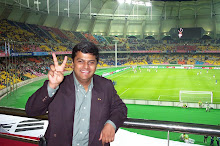There used to be a game show hosted on DoorDarshan Mumbai in early 80s called 'What’s the Good Word?' hosted by top etiquette trainer and Actor Sabira Merchant. I think many of us still carry nostalgia about this show. I still remember how I used to eagerly await this weekly episode that used to telecast late at 10:30 midweek. Just to remind the format, let me explain it. Three teams of two players each competed over guessing the key word with a list of related clues. Play began with an introductory clue. For example, a set might begin with "This can either be a friend to man or an enemy." Clues would then be read while the timer clicked down. Clues for this sample set might be: Wild, Red, Flash, Gun, Ants, Side, Truck, Hydrant, and finally Fighter (a maximum of ten clues would be revealed). The good word, of course, is FIRE. When a team rang in to answer, they would write their response down. If they were correct, they earned one point for every clue that was revealed. If they were incorrect, the team scored 11 points. Team with least score won. Similarly in life, we always continuously play a game of choosing correct words to express ourselves. But many of the times we end up choosing wrong word and complicate our lives. Right words can heal while wrong words can destroy.
Nathaniel Hawthorne wrote: “Words. So innocent as they are, as standing in a dictionary, how potent for good and evil they become in the hands of one who knows how to combine them.” We are surrounded by people who have destroyed us at some point of time by choice of the words which are apparently innocuous but actually mean something unpleasant in unrelated context. They penetrate guards we build around us through careful indictors to avoid discussion on sensitive topics. Sometimes people do intentionally but problem is that most of the time it’s done unconsciously based on insensitivity of the speaker. There is another quote that “The magic of words is that they have the power to do more than convey meaning; not only do they have the power to make things clear they make things happen.” The implicit meanings and varying contexts add to potency of the words and their usage. A careful and sensitive speaker should take cognizance of all the meanings and contexts before using them.
For those creatively inclined towards humor, use of wrong words has created hilarious situations. The term malapropism refers to the incorrect use of a word in place of a similar-sounding word, typically with a humorous result. President George W. Bush was called out for several malapropisms, perhaps the funniest being “We cannot let terrorists and rogue nations hold this nation hostile or hold our allies hostile.” Close, but we’re pretty sure he meant “hostage,” not “hostile”! A ‘spoonerism’ is when a speaker accidentally mixes up the initial sounds or letters of two words in a phrase. The result is usually humorous. Example: ‘shake a tower’ (instead of ‘take a shower’)
Carefully chosen words have avoided wars in past while created controversies as we have seen in many instances. Once incident stands out as an example. To quote verbatim: In October 1962, the world came very close to a devastating nuclear war between two superpowers; the USA led by President John. F. Kennedy and the USSR were led by Nikita Khrushchev. The whole drama started when the CIA discovered that medium to long-range Soviet ballistic nuclear missiles were being built on the Island of Cuba, just 90 miles off the coast of Florida. The fate of millions of people around the world depended on how these two men would communicate with each other. Instead of sending his army to invade Cuba, he decided to parley with Khrushchev via exchange of letters in order to see if they could find a way to resolve this conflict without having to annihilate each other in the process. On 22 October 1962, John F. Kennedy addressed the nation via live television broadcast. His message was intended for the domestic audience but also for the international public at large. Both Kennedy and Khrushchev chose their words carefully, those words had so much power that they suffice to put an end to this conflict and save the world from jumping into the M.A.D world of Mutual Assured Destruction. During our work and in personal life we have to be a statesman. L H Lidell has said: “Keep strong if possible. In any case, keep cool. Have unlimited patience. Never corner an opponent and always assist him to save face. Put yourself in his shoes, so as to see through his eyes. Avoid self-righteousness like the devil, nothing is so self-blinding.”
Sometimes words can kill; they can easily arouse feelings of fear and anxiety. History is full of events where the smallest of occurrences had the most momentous consequences. Words uttered to the wrong ears can create offenses that can result in the fall of empires and wipe away complete nations. There are serious incidences in history where a replacement of simple alphabet has created entire chapter in History. The entire espionage game during cold war has created very intriguing case studies of communications and code words built as a protocol. World wars changed the course of history through misleading information and carefully planted messages.
Obviously, there are certain circumstances in life that understandably leave us speechless, and yes, in such instances, maybe it's warranted to say something along the lines of "words cannot express how I'm feeling right now." Somehow, I feel there is nothing in this world that cannot be expressed by words. We can always find words that can describe our experiences. Our languages are capable to handle every emotion. But there are some occasions where silence will serve better than a careful selection of words. And every individual should have that sensitivity to use silence as a language when situation warrants.


